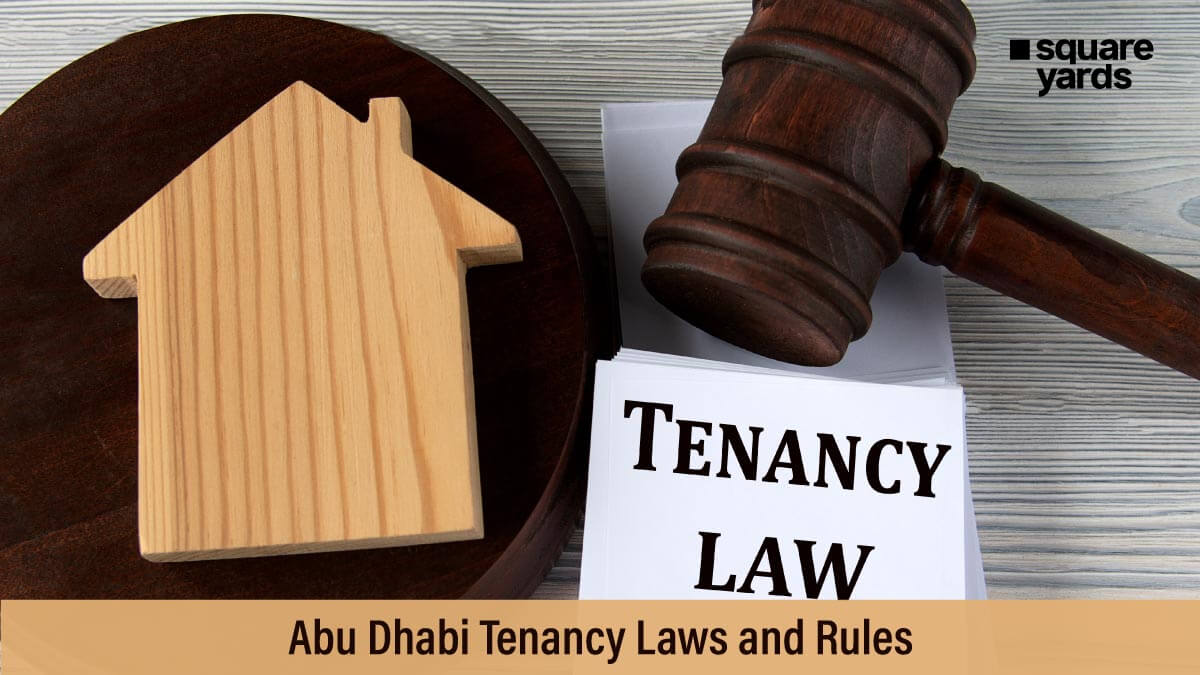For many working expatriates in the UAE, Abu Dhabi, the capital of UAE, is a haven, the place they consider a home away from home. Due to emergent opportunities and industrialisation, Abu Dhabi has emerged as a business hub. Mesmerizing tourist attractions in the emirate, such as the Ferrari World Abu Dhabi, Jahili Fort, Al Ain Palace Museum and the Louvre Museum, make it the perfect location for an easy weekend getaway. Keep reading our article to gain a quick grasp of the important tenancy laws in Abu Dhabi.
If you have recently been thinking about relocating to Abu Dhabi for work or other reasons, it is critical to understand your rights as a tenant in Abu Dhabi. While Abu Dhabi might seem like a lucrative location to settle down in, not knowing the tenancy laws in Abu Dhabi could land you in hot water. By understanding Abu Dhabi tenancy laws, you can also compare them to Sharjah tenancy laws and Dubai tenancy laws for a fair comparison.
Tenancy Laws in Abu Dhabi
Let’s look at the most important laws every tenant must know before renting a property in Abu Dhabi. This article can provide an easy-to-grasp understanding of the important tenancy laws in Abu Dhabi.
Rights as a Tenant in Abu Dhabi
Knowing your rights as a tenant in Abu Dhabi is critical to ensure your landlord doesn’t exploit you during the lease period. Here are certain key tenants rights in Abu Dhabi that you should be aware of:
-
- Notice for Eviction Period
- Rental Dispute Settlement Committee of Abu Dhabi
- Maximum rental price cap
- Legal rental hike frequency
- Landlord maintenance of the property
- Tenants’ rights in Abu Dhabi in the event of the death of the landlord or sale of rental property
- Legal registration of the tenancy contract to protect the tenants’ rights in Abu Dhabi
Abu Dhabi Rental Price Cap

Knowing your rights as a tenant is critical to averting difficult issues. As per resolution no. 14 of the tenancy laws in Abu Dhabi, the rent can be increased by a maximum of 5% when renewing the lease. This law was revoked in 2012 and brought into effect in December 2016. This increment can be implemented only annually as per the tenancy laws in Abu Dhabi. Additionally, the tenant must be informed of the increment in rent at least two months before the contract’s expiry date for residential property. If the landlord fails to abide by said regulations, the tenant has the right to raise a dispute with the Abu Dhabi Rent Committee.
Tenant Notice Period
As per convention, Abu Dhabi leases remain in effect for a year. However, there are no legal regulations stipulating the lease tenure. After the expiration of the tenancy contract, it can be jointly renewed by the tenant and the landlord. The landlord retains the right to deny any request for renewal of the tenancy contract. If the landlord wishes to evict the tenant after the expiry of the lease, they must issue the tenant a Notice for Eviction (NOE) in advance. The NOE must be issued at least three months in advance for commercial rental properties, and for residential properties, it must be issued two months before the lease expiry date. Similarly, if the tenant is planning to vacate the property after the expiry of the lease, they must notify the landlord at least two months before the lease expires. Hence both the tenant and landlord are bound by the notice period clause.
Tenancy Contract Registration
After the tenant and landlord have agreed on the rental terms and conditions, the contract must be registered at the Abu Dhabi Municipality (ADM). The Abu Dhabi rental contracts and related information are maintained in a system known as Tawtheeq. The landlord must register both the property and related tenancy contracts at the Abu Dhabi Municipality. As per your rights as a tenant in Abu Dhabi, you can seek and verify the property registration certificate from the landlord. The tenancy contract must mandatorily be in Arabic and optionally in English. Alternatively, the registration at ADM can be carried out through a property management company.
Occupancy in Abu Dhabi Rental and Residential Property

Per the tenancy laws in Abu Dhabi, certain regulations pertaining to rental unit occupancy exist.
-
- A residential apartment must have a minimum of 14 sq. m available for each resident.
- The tenants should not overcrowd the residential property by utilising halls or corridors as a substitute for bedrooms.
- A maximum of one family is allowed to occupy a residential apartment, whereas only up to three people can occupy a single bedroom, in the case of bachelors.
- The landlords are forbidden from leasing a single residential property as multiple units without seeking prior permission.
- If a family rents a residential property, they cannot share it with unrelated individuals.
Housing Fees
As per Abu Dhabi Council Resolution No. 13, the tenant must pay the rental unit’s housing fee to the Abu Dhabi Municipality. The standard housing fee rate in Abu Dhabi is 3% of the annual rent.
Abu Dhabi Rent Dispute Settlement Committee (RDSC)

The rental dispute settlement committee of Abu Dhabi handles tenancy disputes between the tenant and the landlord. Abu Dhabi Rent Dispute Settlement Committee (RDSC) is generally deemed binding upon both parties. However, if the claim amount exceeds AED 50,000, the tenant or the landlord can file an appeal within 15 days. For claims exceeding 300,000, either party can approach the Court of Cessation within a month of the judgement date. The legislation also states that the tenancy contract must be registered in the Abu Dhabi Municipality’s Tawtheeq system to submit a dispute application to the Committee.
How to File Rental Disputes in Abu Dhabi?
To file a rental dispute with RDSC, follow the steps listed here:
-
- Visit the RDSC service desk and apply with the required attachments. These include a copy of the rental agreement, trade license for businesses, copy of passport, two copies of the original petition, and a power of Attorney where applicable.
- Complete the complaint form.
- Pay the required fees and make sure you obtain a receipt. This is generally 4% of the annual rent, capped at AED 10,000, the cost for newspaper advertisements when needed and additional service/deposit charges.
- Subsequently, you shall be given a date for the first session
Abu Dhabi Tenancy Laws vs Dubai Tenancy laws
Though both Abu Dhabi and Dubai have comparable rental rates, there are quite a few key differences between the tenancy laws of the two emirates.
-
- According to Dubai tenancy laws, the rent can only be increased if the rental property’s current rent is between 11% and 20% of the average rent. However, according to the tenancy laws in Abu Dhabi, a 5% rent increase is allowed annually.
- In Dubai, the landlord must inform the tenants of any hike in rent at least three months before the rental contract expiry, and the tenant must revert at least 60 days before the contract expiry. However, in Abu Dhabi, the landlord is mandated to inform the tenants of rent hikes only 60 days before lease expiry, in the case of residential apartments.
- Abu Dhabi rental contract registration is done through Abu Dhabi Municipality’s (ADM) Tawtheeq system. In Dubai, the rental contract is registered with the Real Estate Regulatory Agency (RERA) through the Ejari system.
What’s the Takeaway
Abu Dhabi is currently one of the most preferred locations for expatriates after Dubai. However, many have been second-guessing their decision to move to Abu Dhabi due to the rent increase. Once you understand the important tenancy laws in Abu Dhabi, navigating the tricky waters of renting a property becomes easier. For instance, knowing that your Abu Dhabi landlord can only increase a maximum of 5% of your rent annually can save you from exploitation. Knowing your rights as a tenant can save you from undesirable tenant–landlord disputes. Similarly, it can also avert possible legal hassles or fines. For further information on tenants’ rights in Abu Dhabi and related queries, you can directly visit the official website of the Abu Dhabi Municipality.
Some More Useful Articles for You :
| All About Abu Dhabi Property Laws | Abu Dhabi Property Laws |
| Guide To New Bounced Cheque Law in UAE | New Bounced Cheque Law in UAE |
| Know About Cost of Living in Abu Dhabi | Cost of Living in Abu Dhabi |
| Abu Dhabi’s Free Attractions | Places To Visit in Abu Dhabi |
Frequently Asked Question (FAQs)
Can a landlord evict a tenant in Abu Dhabi?
Yes, a landlord can evict a tenant in a residential unit by serving an eviction notice at least two months before the lease expiry date.
What are the rules of a tenancy agreement?
Generally, a tenancy contract consists of mutual terms of the agreement between the tenant and the landlord concerning rent price, maintenance, tenancy period and such.
Can the landlord evict the tenant forcefully?
As per Abu Dhabi rules, the landlord can only evict the tenant after serving an eviction notice two months before the lease expiry date.
Can a landlord evict you without a court order?
If a landlord has already issued a Notice for Eviction (NOE) two months before lease expiry, they can evict you once the tenancy contract expires without a court order. The RDSC can ask tenants of at least two years to vacate a property if it deems that the property has suffered damages due to the tenant.
Can the landlord terminate the tenancy agreement?
Yes, both the landlord and the tenant have the right to terminate the tenancy agreement. However, it must be informed before the lease expiration date.



































